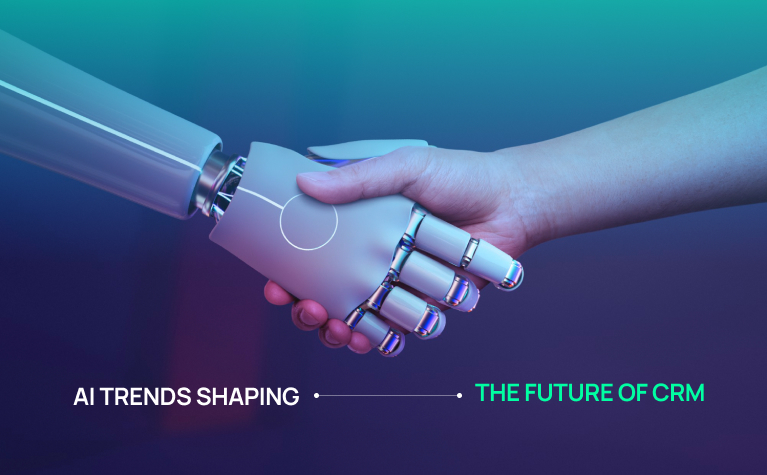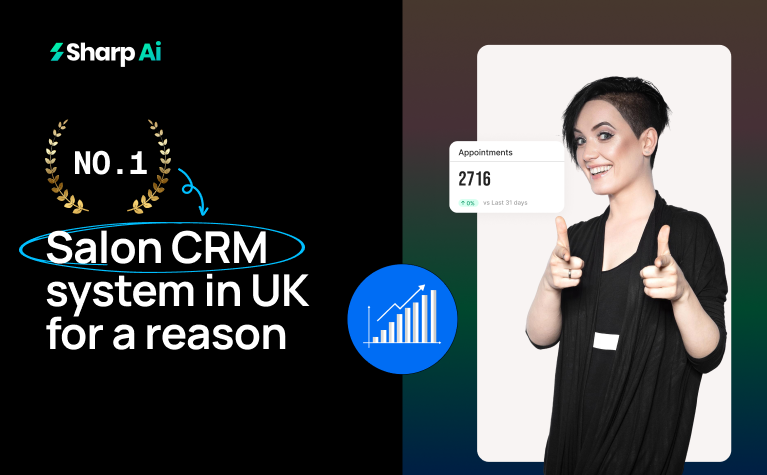Artificial intelligence-based customer relationship management (CRM) systems aren’t merely tools anymore—the results they offer for sales are star quality. What was once basic organisational software has now become the engine of growth and innovation. If a company doesn’t have an AI-driven CRM these days, it’s behind the curve.
In the IT universe, I have not experienced such fast evolution of a technology as AI. Only a few years ago this was a futuristic hype — today it’s giving real, tangible advantages to the sales teams on a daily basis. The best part? AI is doing the grunt work and the monotonous tasks that nobody wants to do, which leaves salespeople to do what they’re best at: building relationships, thinking critically and closing sales in that irreplaceable human manner.
At the end of the day, integrating AI into CRM is all about working smarter. It crunches numbers, recognizes patterns, and can automate the mundane task so you can get to what humans do best – talking to people. In today’s competitive sales sector, that is not only a nice to have but a need to have. I mean hyper-accurate forecasts, pinpoint targeting, and actionable insights that actually help you sell more. That’s not the future — it’s already how smart teams are successfully using it.
Making Customer Interactions Personal and Desirable
Modern sales team members are continually juggling discussions with dozens of potential customers, all of whom are in different stages of their purchasing journey. Personalization is great for response rates, but creating unique emails for every contact takes time that could be spent elsewhere. Smart AI tools mean salespeople can personalise each interaction on the spot – tweak messaging on-the-fly, create stunning emails in seconds, and fit content length for different languages and situations.
The latest/best CRM tools are integrating AI right into their interface, so you no longer have the friction of having to jump and out of applications. This tight integration prevents errors and allows sales teams to do what they do best – engage with customers rather than fight with technology.
The Changing CRM and its Pain Points
Although most companies have adopted CRM technology, few have been able to overcome the challenges of implementation and siloed systems. Businesses are slowly evolving beyond basic CRM usage to more advanced applications, but big challenges stand in the way.
A recent Forrester study (conducted on behalf of Salesforce) found some key gaps: 58% of companies have challenges with siloed data and creating analyses with meaning, and the same percentage lack a single customer view across departments. These results also shed light on the way information is siloed, making it impossible for organisations to create a full picture of customers.
The study also finds 80% of companies admit that their CRM systems are not being used to their full potential with it predominantly being used to support sales and service teams and not in its broader potential.
This broken process leads to lack of visibility – campaigns can successfully connect to prospects, only for sales to be left in the dark until the client mentions these engagements. CRMs with AI share such insights across the enterprise, ensuring interdepartmental, rich-context customer experiences. Final mission is to establish integrated platforms that link sales, marketing, service and commerce to provide unified, omnichannel customer experiences at scale.

Intelligent Automation
Here’s the thing: Sales automation is not really about taking away from people – it’s about giving back to them. When AI is in charge of things like categorizing leads, scheduling appointments and managing email sequences, that’s more time in your team’s week to spend actually selling. It’s real payoff: McKinsey analyzed automation’s effects and concluded it results in 10-15% efficiency gains, happier customers, and up to 10% sales spikes. In today’s market, that’s not merely helpful; it is critical to staying ahead.
A powerful and top crm software records in-depth information about every interaction a customer has, down to email responses and calls to support. AI mines this data to reveal nuances in customer satisfaction that would otherwise remain hidden, and it also determines which relationships are most likely to bear fruit. It’s more than just analysis but also actionable insights on when to engage, what content resonates most with your audience and what type of content converts browsers into buyers. These smart insights allow sales teams to prioritize their efforts so they’ll have the biggest impact.
Forecasting Revenue Sales Optimization
Accurate estimation of revenues is the key for strategic decision making and optimal resource allocation. AI refines sales forecasts with a comparison of past performance, customer buying patterns, and macro-level trends such as industry shifts. This helps companies to take measures and adjust their strategies at market speeds.
AI also pinpoints holes in the sales pipeline and recommends data-driven improvements to make the process more efficient and shorten deal duration for optimal conversion.
Protecting Customer Trust
Integrating AI into CRM has many benefits and advantages; but, it also requires a great deal of commitment to protect the sensitive data of today. Businesses have no choice but to focus on some privacy compliance beneath regulations developing at an excruciating pace — proactively protecting and securing customer data breeds trust while mitigating risk.
Considerations of the ethics of AI use involve getting rid of the bias in and and ensuring we’re being fair with automated decisions. Transparency is a very important factor here, that is – everyone should be able to have simple access to how their data is managed – and they should feel the information they receive is understandable and fair in every moment. Transparency isn’t simply policy, it’s a necessary base of all enduring relationships.
Potential Challenges
The advantages of AI are substantial for CRM systems, but deploying it is not without its challenges. First off, there’s the cost - some platforms offer AI directly as a feature in their interface, some need third-party tools. The deeper the integration, the happier the user.
Then there’s the learning dimension. It can have all sorts of potential benefits, but your team will need to have time to get comfortable with those new AI features. Everyone will probably need a bit of training to make sure they’re getting the most from the system.
And finally, and most importantly: as an AI, it all comes down to the data. If your customer data is stale, incomplete, replete with duplicates, don’t get your hopes up. From experience we can tell you cleaning your data is an absolute must before diving in.
The Benefit of Customer-Centricity
A well-kept single source of truth (SSOT) changes the way business looks at and takes care of its customers. Having accurate data throughout an organisation’s integrated systems allows for accurate customer profiles which leads to more personalised and successful interactions across the board.
This centralized mode of operation has the following four benefits:
- Clean, centralized data moves freely among departments so that teams have up-to-the-minute knowledge to guide their customers interactions.
- Advanced analytics combine human expertise with AI-powered forecasting to inform strategic decisions
- Staff work from a single source of truth, reducing misinformation and duplication of effort.
- Using the appropriate tools and data, staff have greater confidence, are more productive, and employee morale and customer satisfaction ratings increase.
Finding A Middle Ground Between AI And Human-Centric Approach
There are certainly advantages to AI-driven CRMs, but as with anything, striking the right balance is key. Over-automation can remove the human touch that creates those very real customer relationships, and make the experience seem phony and forced. The real answer is leveraging automation to optimize the sales process, while still leaving room for the human experience. This balanced approach allows sales teams to leverage the insights offered by AI without losing that human touch that customers value most.
AI is reinventing customer relationship management. With AI-powered CRM businesses receive a strong set of growth tools which offer outstanding customer experiences and competitive advantages. With AI technology progressing, it is going to become more and more important for sales and CRM, and early adopters will have the advantage over the competition in the modern market.
1. Hyper Personalized Customer Engagement
It is impossible to keep up authentic relationships with thousands of customers — so long as AI comes into play. Perfect, personalized messaging doesn’t have to take you forever to write with ready-to-use replies that adjust language as well as tone on the fly. Today, AI is baked directly into modern CRM features, removing the requirement for add-on tools and allowing for truly personalized engagements at scale.
AI’s analytical strength can take customer segmentation to new levels. Intelligent systems automatically classify contacts according to their behaviour and preferences. This enables:
- Demographic-based targeting (location, industry, job title)
- Engagement tracking across all touchpoints
- Website activity analysis for intent signals
- Predictive scoring for conversion likelihood
2. Intelligent Virtual Assistants Redefining Support
Today’s AI chatbots are a long way from scripted responses. Fueled by machines that comprehend natural language, these AIs are now fielding more difficult questions, knowing when to pass on calls and just how to sound more human than you would expect.
Always-there AI support changes customer service forever. Immediate aid is now on hand 24 hours a day, eliminating the restrictions of conventional office hours.
Top tech leaders are extending the limits with multi-channel AI assistants that will handle even the phone calls. These sophisticated solutions understand spoken demands, develop a suitable reply and may soon be connected to wearables and cars – possibly transforming the way commerce everywhere interacts with customer communication.
Your Business With Modern CRM Solutions
All businesses maintain client relationships in some kind of way – electronic or on paper. But companies that are serious about providing world class customer experiences and also operating efficiently need specialized CRM technology.
The trajectory of your company’s CRM is dependent on choosing solutions that encourage collaboration and that can make your workflows unique to you. An optimal platform should make a balance between speed and integration, with an added feature of power that allows cloud accessibility, mobile readiness, and ability to customize for fitting into the enterprises’ need.
In an ideal scenario the CRM becomes the command and control centre for your organisation in terms of customer intelligence. Teams find accurate information right away – no more digging through separate systems to make the best decisions. You’ll see the entire story of every lead – from what part of marketing first engaged them to the sales conversation to the support visit after purchase. This whole view allows for individual nurturing at each stage – and the ability to turn prospects into customers – while continuing to foster customer relationships with offers and appreciation.

The Future of CRM Is How You Use It
CRM is a sector borne of innovators and the entrepreneurs who are constantly bringing cutting-edge solutions to market – but the next chapter is not just about ‘tech breakthroughs.’ Instead, real gains will be made as organisations optimise the use of their customer relationship management CRM to enhance the experience of customers.
Only 20 years into the era of the internet, top CRM software have rewritten the rules of commerce. Consumers now expect unique service from every brand they interact with and they have access to every global brand at their fingertips.
To succeed in this environment, businesses require flexible CRM solutions which easily integrate into their tech stack. Through the appropriate training of their teams and making these platforms the single source of truth for customer intelligence, companies are able to deliver delightful experiences across every customer interaction.
Salesforce Einstein 1 is an awesome instance of this future, [combining] all customer touch points into a single smart system that connects companies to their customers no matter where in the world or on what device.
Sharp AI – The Engine for Smarter Business Operations
Sharp AI transforms how modern companies work by embedding intelligence across every operation. Our AI solutions don’t just automate – they elevate. Customer service becomes seamless with 24/7 intelligent support that learns with every interaction.
Project management evolves through predictive workflow optimisation that anticipates bottlenecks before they occur.
The real power lies in Sharp AI’s ability to turn data into decisions. Real-time analytics provide actionable insights the moment you need them, while adaptive algorithms continuously refine processes for peak efficiency. From front-office customer interactions to back-office operations, Sharp AI creates a responsive, insight-driven business environment where every system works smarter.

Conclusion
AI is turning the CRM from a data tool into a growth engine. By automating processes, personalising customer engagements, and providing data, AI-powered CRM achieves tangible ROI: better productivity, more sales, and better customer satisfaction.
The competitive advantage is clear. Businesses implementing AI CRM solutions today will outpace rivals tomorrow. Success requires choosing the right platform, integrating it effectively, and training teams properly. The future of customer relationships is intelligent, adaptive, and data-driven. Adopt AI CRM now or risk falling behind.




